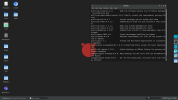It's not just FreeBSD. I see some of the same problems on Linux too. And on my personal Mac, the problems only don't appear because ... will be explained below.
The root of the problem is that there are multiple systems used to install "packages". One is pkg, which is by definition OS-specific (only works on FreeBSD, duh). The other is pip, which is by definition language specific (only does python, duh). So even in a simpler world of running ONLY ONE operating system (FreeBSD) and ONLY ONE language (python), it gets painful:
- For some packages, you can only use "pkg install", because they need FreeBSD-specific patches, and the generic pip version does not work.
- For some packages, you can only use pip, because nobody has bothered to make a FreeBSD pkg.
- And for some, you can choose either package installed, but you don't get the same version, usually because the FreeBSD pkg maintainer (a human volunteer) is running behind.
- And for some packages, it works perfect.
Now when it comes time to do upgrades, you need to run "pkg update/upgrade", and the pip magic required to do all upgrades (which is not quite trivial, you first need to list the installed packages). And every time you do this, some packages may migrate back and forth among the four categories described above.
If you add virtual environments to the list, it gets even harder, because those 4 categories are now environment specific.
What is the fix? Tough question. Try to do updates, if all your applications work, go drink. If they don't, mess around (usually I move from pkg to pip, and that often helps), or go back to installing from source. I have exactly the same issues on Linux (Debian running on RPi in my case). And there it's even harder than on FreeBSD, because there is no way to do a major version upgrade sanely, so I regularly have to wipe and reinstall, which increases the churn between the four categories above. The only reason this doesn't affect me on the Mac is: There I use no package mechanism other than pip for Python code, because on the Mac there don't seem to be any OS-specific patches needed.
In your case, it's even worse, since you have to drag a Linux install into the mix too.



